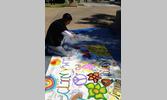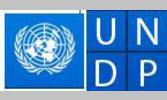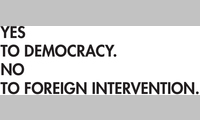
In this bulletin we ask if the Global Movement for a Culture of Peace is growing, looking especially at the articles from its eight program areas that we have cited in the bulletins over the course of the past year.
(1) Peace education. We continue to see more CPNN articles devoted to peace education than to any other area. In addition, we may see signs of progress in the newsletter of the Global Campaign for Peace Education which has has grown to the point of citing thousands of initiatives. Culture of peace studies in universities and schools are especially important but only beginning to develop.
(2) Sustainable development. Ever since the Rio Conference of 1992, the ecology movement has set the standard for development of consciousness and institution-building. Leadership continues to come not from the states of the world, but from the civil society, especially youth, city initiatives and indigenous peoples - and, as some have argued recently, from part of the private sector
(3) Women's equality. This year we have seen increasing leadership by women with recognition of their effective and exemplary action as reflected in numerous CPNN articles. At the same time there are more and more initiatives in the struggle against the violence which has traditionally kept women down.
(4 and 5) Human rights, tolerance and solidarity. The annual reviews by Amnesty International and Human Rights Watch continue to show us that this is a long, slow struggle in which there is more consciousness than ever, in the face of continued suffering by victims of exploitation and war and violations of human rights by the entrenched institutions of the world, both states and the private sector.
(6) Democratic participation. There are many CPNN articles about local, isolated intiatives, but It is difficult to assess if there is progress on a global level in democratic participation. A report last year by the Inter-Parliamentary Union and UNDP came to mixed conclusions. Perhaps the most important development is participatory budgeting which began in Brazil and has now spread to over 1500 cities around the world. Ironically, the website of the International Observatory on Participatory Democracy is not available in English, French or Spanish, but only in Catalan.
(7) Free flow of information. In a dialectical process, at the same time as the nation states attempt more than ever to control information , we have access to more and more independent news media, and more and more information from courageous whistle-blowers such as Julian Assange and Edward Snowdon who risk imprisonment and even death by revealing state secrets.
|
VIDEOS |
French Spanish |
(8) Disarmament. Although progress in disarmament is confined to a few weapons systems such as landmines and cluster bombs, where leadership has come from the civil society, there was a first step forward this year in the adoption of an Arms Trade Treaty by the UN General Assembly.
As for the actors in the Global Movement, the leadership continues to come from civil society, as it did during the 2001-2010 Culture of Peace Decade. It would be useful to have figures on the extent of involvement in the International Day of Peace (September 21), but they are only available through 2009. As for other actors, we have already mentioned increasing leadership by women. Also, everywhere we may see increasing involvement and leadership by the youth of the next generation.
And as for the United Nations, which played a leading role in the culture of peace at the end of the last century and then faltered, they are beginning to be involved once again.
Although many European and North American actors, both individuals and organizations, were deeply involved in the launching of the Global Movement for a Culture of Peace, the leading initiatives recently have come more from Latin America and Africa.
Also, the process of the Arab Spring continues to advance despite murderous resistance by state actors, violence by radical movements and devastating military interventions by the Americans and Europeans. The Arab Spring will certainly take many more years to develop its full contribution to the culture of peace, but if we look across the years, given that such a movement was not even thought of just a few years ago, we must see that there has been remarkable progress.
In sum, there is progress! But is the Movement growing fast enough to cope with the crises that threaten the world? As stated by the slogan of the International Year for the Culture of Peace, the answer is in our hands. Only time will tell if our efforts prove effective.









